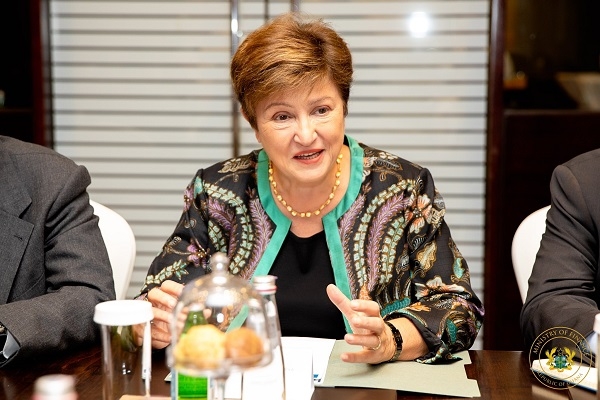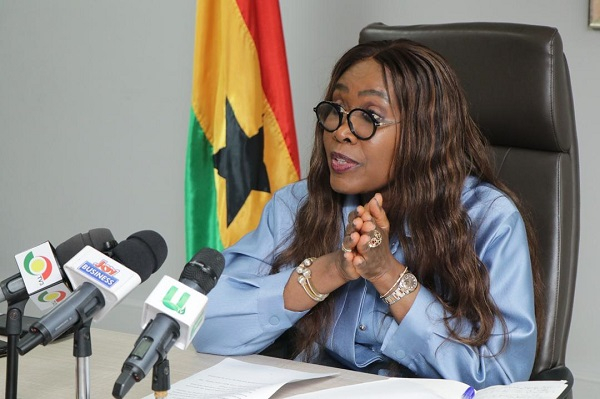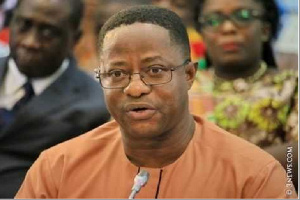Ghana, other election bound-countries must build fiscal buffers – IMF

Ghana, and other countries around the world who will be holding elections in 2024 have been encouraged by the International Monetary Fund (IMF) to prioritise fiscal consolidation as they go to the polls.
Kristalina Georgieva, Managing Director of IMF said this at a press briefing on the Fund’s Global Policy Agenda, asking the election-bound countries to immediately develop medium-term fiscal prudent measures and stick to its implementation.
That, she said, would be critical in ensuring that the economic gains made in the past few months were not eroded, especially in most vulnerable countries.
The briefing, held in Washington, USA on Thursday, April 18, was monitored by the Ghana News Agency.
This call by Ms Georgieva is in the light of findings from the IMF fiscal monitor, which showed that deficits in election years tend to exceed forecasts by 0.4 percentage points of Gross Domestic Product (GDP), compared to non-election years.
The situation is no different from Ghana whose total expenditure, including arrears clearance and discrepancy for 2020 (an election year) amounted to GHS100.053 billion (26.1 per cent of GDP).
Expenditure stood at GHS80.706bn (18.4 per cent of GDP) in 2021, GHS109.421bn (18.5 per cent of GDP) in 2022, and GHS104.6bn (12.2 per cent of GDP) as of August 2023 – non-election years.
However, in 2024, which is another election year, the government is projecting a total expenditure (on commitment basis) to be GHS226.7bn, which is 21.6 per cent of GDP.
Cautioning against higher election-related expenditure, Ms Georgieva said that the world had become prone to more frequent shocks, and advised countries to urgently build fiscal resilience to be prepared for the next shock.
“Still, part of the [world’s] population needs support, and half of the world is going to the polls; the time has come to adopt medium-term frameworks for fiscal consolidation,” she said.
“This is not a time for ease and comfort. It’s time to dare and endure, and dare we will, as we have done in the past so far to our members in the best possible ways, tailored to their individual needs,” she added.
The IMF Managing Director recommended that countries should have a balance between mobilising revenue and improving spending efficiency, with a focus on not burdening the most vulnerable people.
She called for a revival of growth prospects through strengthening governance, cutting red tape, increasing female level market participation, improving access to capital, and implementing structural reforms in productivity, as well as investing in human capital and green transition.
She also encouraged new efforts to promote and maintain open flows of goods and capital to build on what had worked in lifting the living standards of people in the past, while ensuring that the benefits were widely and fairly shared.
On Artificial Intelligence (AI), Ms Georgieva indicated that the world could no longer underestimate its relevance, as such more coordination on global rules should be prioritised just as the technology and the skills to tap into AI.
On the part of the Fund, she said they were directing a significant part of their research towards policies that would enhance growth prospects of its members, particularly, those severely impacted by exogenous shocks.
“We’ve reached our target of US$30 billion in Special Drawing Right (SDR) in precautionary balances against financial risk – this financial strength allows us to play our role at the centre of a time of exceptional uncertainty,” she said.
The fiscal monitor report observed that globally, inflation had fallen, financial conditions have eased, and risks to the outlook were balanced.
Nonetheless, it recommended that governments avoided slippages, by focusing more on rebuilding buffers and safeguarding fiscal sustainability over the medium-term.
It also encouraged governments to immediately phase out legacies of crisis-era fiscal policy, including energy subsidies, and pursue reforms to curb rising spending while protecting the most vulnerable.
Particularly, for emerging market and developing economies, including Ghana, it urged governments to raise their tax revenue potential by broadening tax bases, and improving the design of their tax systems.
Also, the report underscored the importance of strengthening revenue administration, indicating that, “such measures could, in ideal circumstances, yield as much as an additional nine percent of GDP.”
Source: GNA





